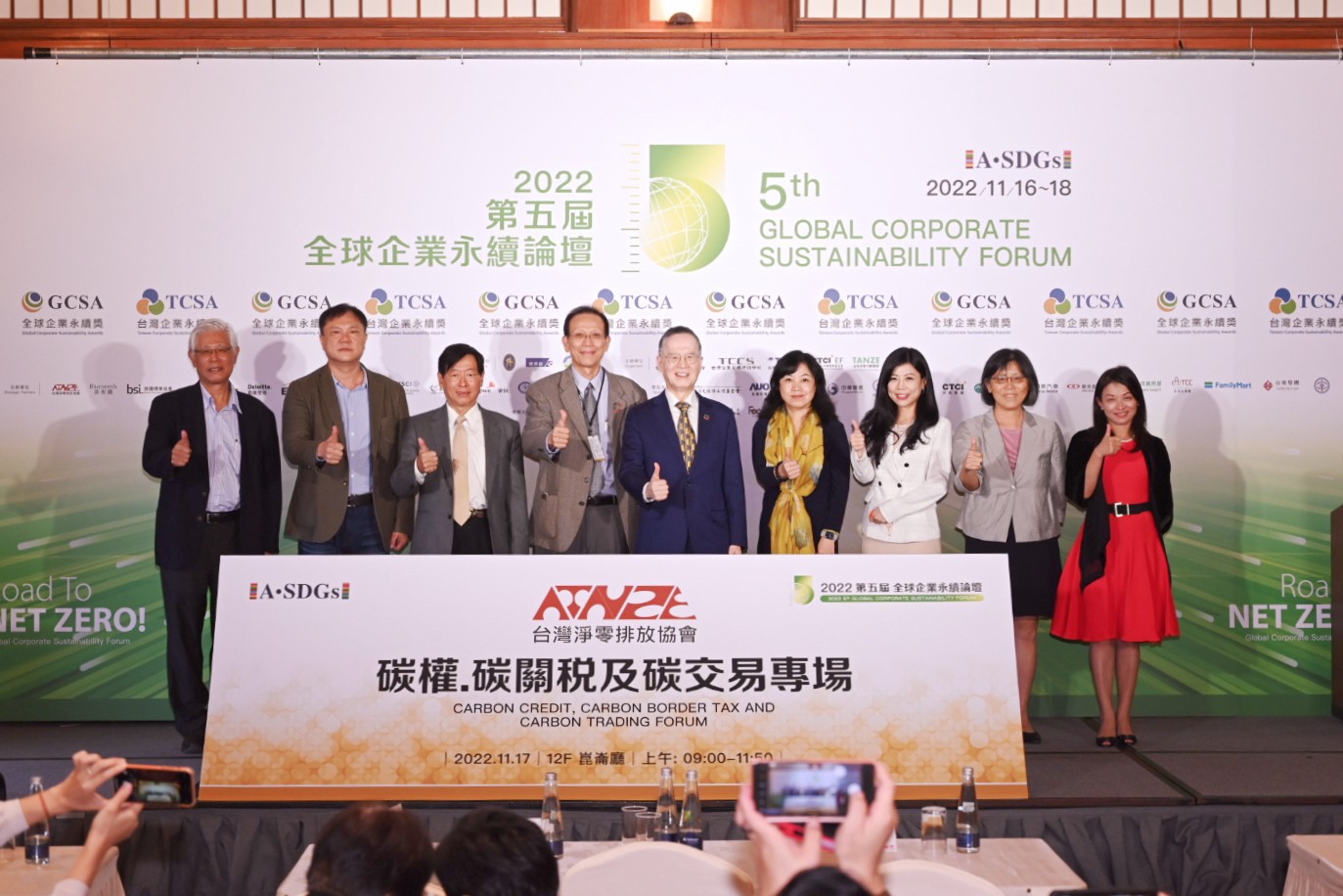ATNZE participated in the annual grant event of Taiwan sustainability “2022 5th GCSF Global Enterprise Sustainability Forum” and held the “Carbon Credit, Carbon Tax and Carbon Trading” forum, drawing 285 guests to attend the forum. The forum was concurrently live-streamed on Facebook for fans to join.
ATNZE Chairman CHIEN YU-HSIN stated in the speech that the full capacity of the audience at the forum shows that the issue of carbon credit is a popular demand. This year after the government declared net zero path, the “Climate Change Bill” will also hit the road. Carbon tax and carbon expenses are the most pressing issues that need to be faced. In recent years, the importance of Taiwan increased due to the supply and demand chain, however, the current supply and demand chain changes fast. Chien Yu-Hsin suggested that this is the beginning of an important era and that everyone should learn and take a new direction, in order to establish the best opportunities for Taiwan.
ATNZE secretary general Hsiao-Kan Ma first invited Aleksandra Kozlowska – section chief from the European Economic and Trade Office to serve as the speaker. Aleksandra Kozlowska explained the background of the Carbon Border Adjustment Mechanism (CBAM), operation model and implementation schedule. Aleksandra Kozlowska also expected Taiwan and all countries to cope with CBAM by implementing more environmental-friendly policies and expressed the willingness to participate in the discussion of relevant policies.
Tamkang University Center for European Union Studies Director Li-Juan Chen believed that following the launch of the European Green Deal and the rise of the ESG concept, Taiwan enterprises are under the most impact in the social aspect. The EU claim not only aims at the global supply and demand chain but the global value chain. Taiwan enterprises not only should first understand the background of the mechanism and system operation and prepare corporate health examinations to meet ESG standards and write ESG reports when facing BAM, but also take sustainability action in supporting a friendly environment in daily life.
YC Holding COO Su-Juan Yen pointed out that the benefit of carbon neutrality not only help enterprise meet stakeholder expectation but lower energy consumption costs in order to boost competitiveness. Apart from products and services, enterprises can also adopt carbon verification on all six categories of ISO14064-1:2018 to meet organization carbon neutrality. If the enterprise still fails to meet carbon neutrality after implementing a carbon verification and reduction plan, purchasing carbon credit will be the solution to reach the goals. However, compared with the international market, the development of the current carbon credit market in Taiwan is still inadequate.
Taishin Financial Holding Chief economist and enterprise sustainability office director doctor Zheng-Yu Li stated that the nature of sustainability issues lies in economic issues and the key is to internalize the costs. Following the carbon tax-related measures proposed by the EU and U.S., Taiwan must also speed up the process of completing carbon pricing. The availability of carbon trading also upgrades the importance of financial report disclosure and accounting standards. Moreover, the next 1 to 3 years will be the best time to enter the investment market for carbon credit trading. However, it is important to evaluate the enterprises truly committed to transformation and making a contribution to net zero carefully.
In the second half of the session, Department of Forestry, NCSU professor Yu-Wan Liu first introduced forest carbon sink (green carbo), soil carbon sink (yellow carbo), and marine carbon sink (blue carbon) as the three natural carbon sinks, followed by explaining how the natural carbon sink is converted into carbon credit. Professor Liu also gave an example of the carbon offset system of the Taiwan EPA and the Singapore CIX carbon trading platform to explain the different operations of carbon credit. In the future, there will be many development opportunities for Taiwan’s forest carbon sink to convert into carbon credit, which not only makes financing under climate risks more advantages and increase income from carbon credit but also help enterprises improve their corporate image. However, the high verification costs and high level of information asymmetry as well as high transaction costs are factors that exist with many challenges.
Taiwan Society of Japan Studies Chairman Shi-Yi Jing proposed that enterprises will have higher costs from plastic reduction to carbon reduction in order to reach carbon neutrality and net zero. Hence, enterprises must draft the financial strategies based on budget. To meet caron neutrality, the overall supply and demand chain from the brand to the mid/lower stream suppliers will all face some impact. Taiwan enterprises are the suppliers for many international brands and will inevitably face pressure to cope with transformation or else could only leave the supply and demand chin. Following the gradual development of carbon pricing mechanism and carbon tax by all countries, the “long-term predictable and actual value” are the key to purchase carbon credit.
National Taipei University Institute of Natural Resources Management Professor Jian-Ming Li stated directly that carbon trading system is the solution for the world to reach net zeros. It is also the key carbon emission mechanism for United Nations Framework Convention on Climate Change (UNFCCC). Countries such as Japan, Switzerland, Saudi Arabia, Singapore, and Thailand have made progress in carbon reduction process due to carbon trading. The four advantages of carbon trading system include the validity of costs, encouraging more ambitious carbon reduction goals, promoting economic efficiency and low-carbon technology development, and lowering risks with corporate carbon. Taiwan should learn from Singapore to establish a carbon trading platform in order to lower Taiwan enterprises’ costs in carbon trading.

ATNZE Chairman CHIEN YU-HSIN stated in the speech that the full capacity of the audience at the forum shows that the issue of carbon credit is a popular demand. This year after the government declared net zero path, the “Climate Change Bill” will also hit the road. Carbon tax and carbon expenses are the most pressing issues that need to be faced. In recent years, the importance of Taiwan increased due to the supply and demand chain, however, the current supply and demand chain changes fast. Chien Yu-Hsin suggested that this is the beginning of an important era and that everyone should learn and take a new direction, in order to establish the best opportunities for Taiwan.
ATNZE secretary general Hsiao-Kan Ma first invited Aleksandra Kozlowska – section chief from the European Economic and Trade Office to serve as the speaker. Aleksandra Kozlowska explained the background of the Carbon Border Adjustment Mechanism (CBAM), operation model and implementation schedule. Aleksandra Kozlowska also expected Taiwan and all countries to cope with CBAM by implementing more environmental-friendly policies and expressed the willingness to participate in the discussion of relevant policies.
Tamkang University Center for European Union Studies Director Li-Juan Chen believed that following the launch of the European Green Deal and the rise of the ESG concept, Taiwan enterprises are under the most impact in the social aspect. The EU claim not only aims at the global supply and demand chain but the global value chain. Taiwan enterprises not only should first understand the background of the mechanism and system operation and prepare corporate health examinations to meet ESG standards and write ESG reports when facing BAM, but also take sustainability action in supporting a friendly environment in daily life.
YC Holding COO Su-Juan Yen pointed out that the benefit of carbon neutrality not only help enterprise meet stakeholder expectation but lower energy consumption costs in order to boost competitiveness. Apart from products and services, enterprises can also adopt carbon verification on all six categories of ISO14064-1:2018 to meet organization carbon neutrality. If the enterprise still fails to meet carbon neutrality after implementing a carbon verification and reduction plan, purchasing carbon credit will be the solution to reach the goals. However, compared with the international market, the development of the current carbon credit market in Taiwan is still inadequate.
Taishin Financial Holding Chief economist and enterprise sustainability office director doctor Zheng-Yu Li stated that the nature of sustainability issues lies in economic issues and the key is to internalize the costs. Following the carbon tax-related measures proposed by the EU and U.S., Taiwan must also speed up the process of completing carbon pricing. The availability of carbon trading also upgrades the importance of financial report disclosure and accounting standards. Moreover, the next 1 to 3 years will be the best time to enter the investment market for carbon credit trading. However, it is important to evaluate the enterprises truly committed to transformation and making a contribution to net zero carefully.
In the second half of the session, Department of Forestry, NCSU professor Yu-Wan Liu first introduced forest carbon sink (green carbo), soil carbon sink (yellow carbo), and marine carbon sink (blue carbon) as the three natural carbon sinks, followed by explaining how the natural carbon sink is converted into carbon credit. Professor Liu also gave an example of the carbon offset system of the Taiwan EPA and the Singapore CIX carbon trading platform to explain the different operations of carbon credit. In the future, there will be many development opportunities for Taiwan’s forest carbon sink to convert into carbon credit, which not only makes financing under climate risks more advantages and increase income from carbon credit but also help enterprises improve their corporate image. However, the high verification costs and high level of information asymmetry as well as high transaction costs are factors that exist with many challenges.
Taiwan Society of Japan Studies Chairman Shi-Yi Jing proposed that enterprises will have higher costs from plastic reduction to carbon reduction in order to reach carbon neutrality and net zero. Hence, enterprises must draft the financial strategies based on budget. To meet caron neutrality, the overall supply and demand chain from the brand to the mid/lower stream suppliers will all face some impact. Taiwan enterprises are the suppliers for many international brands and will inevitably face pressure to cope with transformation or else could only leave the supply and demand chin. Following the gradual development of carbon pricing mechanism and carbon tax by all countries, the “long-term predictable and actual value” are the key to purchase carbon credit.
National Taipei University Institute of Natural Resources Management Professor Jian-Ming Li stated directly that carbon trading system is the solution for the world to reach net zeros. It is also the key carbon emission mechanism for United Nations Framework Convention on Climate Change (UNFCCC). Countries such as Japan, Switzerland, Saudi Arabia, Singapore, and Thailand have made progress in carbon reduction process due to carbon trading. The four advantages of carbon trading system include the validity of costs, encouraging more ambitious carbon reduction goals, promoting economic efficiency and low-carbon technology development, and lowering risks with corporate carbon. Taiwan should learn from Singapore to establish a carbon trading platform in order to lower Taiwan enterprises’ costs in carbon trading.

Group photo of forum guests, host and speakers at “Carbon Credit, Carbon Box and Carbon Trading.”


